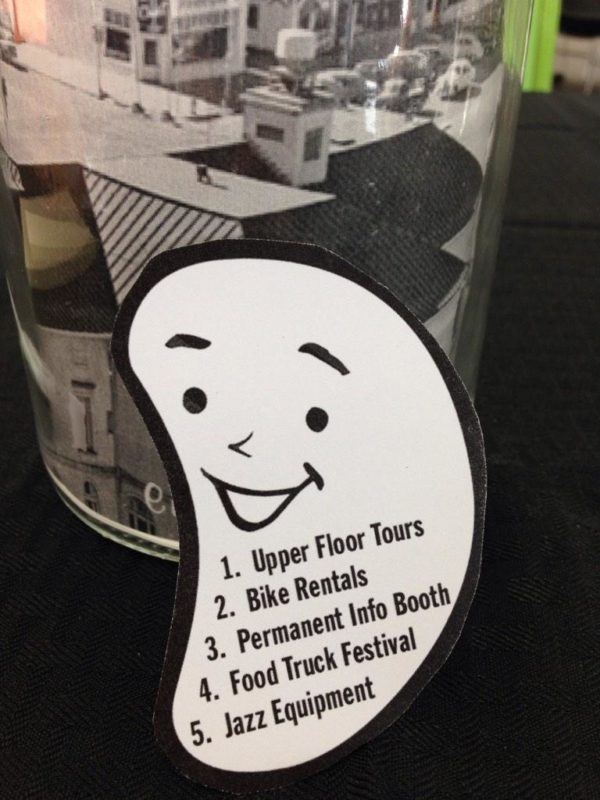
Five businesses and community groups pitched ideas at the first “Food for Thought” event put on by Main Street Enid, Oklahoma. Photo by Becky McCray.
Have you heard of “soup” events?
People pay a small amount, say $5, to attend a local pitch event. Local groups pitch their ideas, everyone votes, and the winner gets the money.
The real winner is the community, of course. It boosts activity, gets people talking to each other, builds momentum and rewards people who are doing great things locally.
The first one I heard of was the Detroit Soup project. I got to attend one when Main Street Enid, Oklahoma, kicked off their series called Food for Thought. Wheeling, West Virginia, calls theirs Show of Hands.
How Wheeling’s Show of Hands Works
Alex Weld and Jake Dougherty from Wheeling Heritage shared more about it at the Main Street Now conference in 2019. Materials from their presentation are currently available through the Main Street Now 2019 app, but I expect they are likely to disappear over time.
Wheeling holds events quarterly. The organizers said they wanted to disprove the common belief that “nothing is happening here.”
Action inspires action, they said. Public action inspires even more action and illustrates change.
Lots of people are invited to come together, pay a small amount at the door and enjoy a bowl of soup from communal soup pots. Local groups share their ideas for a project or business, and everyone gets a vote. Winning pitches earn the money raised, and everyone has a great time.
There’s a lot of talking and networking as people see friends and acquaintances they may not see everyday.
Each event also features an update from a past winner, building momentum.
Getting started
They started small and kept expenses low. They borrowed an event venue and brought potluck soup.
Initially, they worried that ticket sales might not add up to very much award money, so they looked for a sponsor. They found a local business to donate $1,000 seed money for the first winner. Then they put money raised through ticket sales on top of that. The sponsor committed to seed four events that way, a full year. Now that they’ve been going for awhile, even more businesses participate by sponsoring. Now most winners receive around $5,000 total.
They limited the number of pitches to four. That kept the event from being too long and kept it easier to decide who to vote for.
Finding applicants to pitch
To make sure they had four presenters their first time, they personally talked with people to encourage them to participate and pitch. They picked exciting projects, ones they knew would draw people to the event. Over that first year, most of the ideas came from nonprofits. Now more presenters are from small businesses wanting to start or expand.
You can’t put the application up and sit back and wait, they said. You have to groom solid applicants.
What holds people back?
They found that many small business people said they had a worthy idea, but just weren’t ready to pitch. That got the organizers thinking about the barriers holding small businesses back from growing, so they ran their own survey.
What they learned was that there were all kinds of knowledge gaps, different things people struggled with in their businesses. As a result, they began doing more small business training events in town, building a network of potential participants.
Do your own Soup event
As you’re thinking about putting your own spin on this event, think about non-monetary prizes. Jeremy Zeller with Oklahoma Main Street suggested pop-up space for example. What else could you offer winners?
Consider how many “winners” you want, and whether winner take all is the right split. Maybe you can make sure each idea walks out with some funding. Maybe awards can be in proportion to the votes received.
New to SmallBizSurvival.com? Take the Guided Tour. Like what you see? Get our updates.










